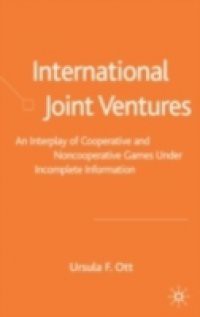Ursula F. Ott provides a theoretical approach to the life cycle of an International Joint Venture (IJV). IJV's are a special form of Multinational Enterprise (MNE), which combines the resources of a local and foreign firm to create a third independent business entity. While there are important gains of an IJV, the failure rate is high. On the basis of game theoretical reasoning, problems and issues of co-operation and conflicts are analysed. Game theory is considered as a useful strategic tool for solving problems in multi-person decision-making scenarios. Thus, its refinements offer robust insights. The book envisages problems by using game theoretical concepts to distinguish conflicting and co-operating elements in the IJV formation, management and even termination process. Solution concepts are then based on rigorous theoretical tools such as common agency theory, contract/incentive theory and repeated games, which are refinements of game theory.

